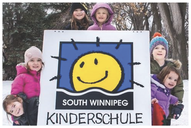Inclusion Policy
South Winnipeg Kinderschule (SWK) is a small German / English bilingual nursery school for 2 to 6 year old children. It is located at 168 Wilton Street, in the basement of St. George’s Anglican Church. SWK was established to allow pre-school children the opportunity to familiarize themselves with the German language and culture in a fun and supportive environment.
SWK welcomes children of all abilities. We recognize that each and every child is an individual and as such has varying abilities and competencies. We value these differences and strive to optimize the learning environment for all those enrolled. Indoor and outdoor areas are arranged so all children can move freely and make choices based on their abilities, interests and needs. Opportunities are provided for all children to participate in social free play and routines throughout the day. Our daily schedule is flexible, so the needs and interests of all children can be accommodated. We use program approaches that best meet the needs and desires of each child and his or her family. Whenever needed, we support families by consulting with early intervention professionals.
SWK does, however, occupy a rented basement space in a building without an elevator. This means that we are at the moment not able to accommodate children in wheelchairs or with other mobility impairments that might make the use stairs unsafe. We are committed to finding a new space which allows wheelchair access.
An additional element that allows SWK to be an inclusive institution is the low student-teacher ratio. Depending on the session this ratio has been as low as 1:6. Moreover parents are not only welcome to, but are encouraged to volunteer.
We are committed to learning more about various disabilities and full inclusion as part of our annual training plan.
The SWK Board of Directors is committed to the principles underlying this inclusion policy and will provide the teachers with whatever additional support and training are required to carry the policy out.
The Director (or a designated alternate) should monitor physical conditions and social situations related to the children and address any deficiencies or difficulties children are having. These may include:
- Review at a staff meeting and, depending on how serious the situation is, share with the board of directors.
SWK welcomes children of all abilities. We recognize that each and every child is an individual and as such has varying abilities and competencies. We value these differences and strive to optimize the learning environment for all those enrolled. Indoor and outdoor areas are arranged so all children can move freely and make choices based on their abilities, interests and needs. Opportunities are provided for all children to participate in social free play and routines throughout the day. Our daily schedule is flexible, so the needs and interests of all children can be accommodated. We use program approaches that best meet the needs and desires of each child and his or her family. Whenever needed, we support families by consulting with early intervention professionals.
SWK does, however, occupy a rented basement space in a building without an elevator. This means that we are at the moment not able to accommodate children in wheelchairs or with other mobility impairments that might make the use stairs unsafe. We are committed to finding a new space which allows wheelchair access.
An additional element that allows SWK to be an inclusive institution is the low student-teacher ratio. Depending on the session this ratio has been as low as 1:6. Moreover parents are not only welcome to, but are encouraged to volunteer.
We are committed to learning more about various disabilities and full inclusion as part of our annual training plan.
The SWK Board of Directors is committed to the principles underlying this inclusion policy and will provide the teachers with whatever additional support and training are required to carry the policy out.
The Director (or a designated alternate) should monitor physical conditions and social situations related to the children and address any deficiencies or difficulties children are having. These may include:
- Asking the custodian to complete and document any required repairs or actions.
- Reviewing enrolment forms, Inclusion Support Program intake procedures and meeting minutes and URIS Individual Health Care/Emergency Response Plan as applicable for any specific requirements for a child with additional support needs.
- Make any necessary changes to indoor or outdoor spaces to make sure children with additional support needs are safe.
- Communicate safety concerns or changes to procedures to all staff:
- Review at a staff meeting and, depending on how serious the situation is, share with the board of directors.
- Make sure safety concerns that relate directly to parents or require a change in their behaviour are communicated by e-mail and posted in a prominent area. If the concern is serious, write a letter to each parent.
